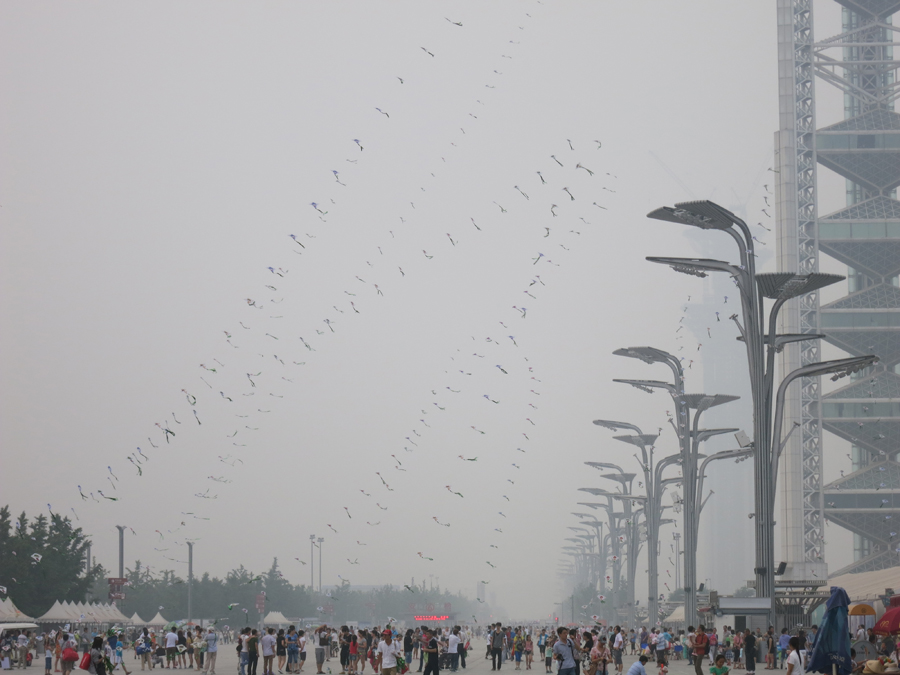You have /5 articles left.
Sign up for a free account or log in.
 Greetings from Beijing, where I am attempting to build formal relationships between my department and two key Chinese partners. Apart from the expected relationship building (lubricated by brutal quantities of baijiu the other evening), negotiations, wonderful hospitality, and linked sightseeing (including to the “real Great Wall,” not one tourist in sight!), I’ve genuinely enjoyed the visit and have many hopes for the types of international collaborative education initiatives we’ve been hatching plans for.
Greetings from Beijing, where I am attempting to build formal relationships between my department and two key Chinese partners. Apart from the expected relationship building (lubricated by brutal quantities of baijiu the other evening), negotiations, wonderful hospitality, and linked sightseeing (including to the “real Great Wall,” not one tourist in sight!), I’ve genuinely enjoyed the visit and have many hopes for the types of international collaborative education initiatives we’ve been hatching plans for.
At the end of every day I’ve tried catching up on emails, and have found some interesting Google alerts piling up regarding Yale-NUS College. I’ve been able to examine some of them, though others are on websites I am unable to access due to censorship of the internet in China. More broadly, I’ve been unable to examine and use my Twitter account (which is a great source of information via the hashtags), our Department's Facebook account, any WordPress.com site (including the WordPress.com version of my own blog), and sites like Human Rights Watch’s press release about the latest eruption of debate about academic freedom and human rights on the Yale-NUS College campus. I also can’t access my own personal website because is located on a WordPress.com site.
Given my recent postings on academic freedom in Singapore (see 'Deterritorializing Academic Freedom: Reflections Inspired by Yale-NUS College (and the London Eye)') I’m wanted to weigh in on this latest debate but will hold off until I get the time in South Korea this week to read everything I need to, free of the Chinese censor’s reach. But catching aspects of the Yale-NUS debate from the ground, here in hazy Beijing, reminds me of:
- The pros and cons of engaging on a programmatic basis (e.g., degrees, human mobility, joint research, training regarding the publication process) versus via forms of “commercial presence” (to use WTO/GATS parlance).
- The importance of identifying and being clear about “non-negotiables” as detailed arrangements -- global assemblages really -- are put together and brought to life.
- The differences that exist between systems, but just as important the problematics associated with constructing binaries (East vs West; Asia vs West; nation vs nation; culture vs culture) where people posit essential qualities and characteristics, including when viewed from the standpoint of the global community of scholars we are a part of.
- The importance of drawing in regional expertise, including people who understand the political economy of state-society-economy relations, which sets the broad context for the establishment of university to university relations.
.jpg) Being here also reminds me of how inaccessible (in China) my department’s Facebook page and Twitter feed is, as well as the Facebook page for the Association of American Geographer’s specialty group I am affiliated with. In such a context, should we (as a department, as a specialty group) care? I do know this entry on Inside Higher Ed (which is not censored) can be read in China, but it can't be when posted on my WordPress.com site. Again, should I care and migrate my own websites to unique URLs not associated with the WordPress platform? Or is this giving in (not that my personal website really matters, but it’s the principle issue I’m thinking about here)? But if we really want to reach our Chinese colleagues and their students, we're de facto excluding them on some levels using Facebook, Twitter, WordPress.com, etc. Is this an issue worthy of more discussion?
Being here also reminds me of how inaccessible (in China) my department’s Facebook page and Twitter feed is, as well as the Facebook page for the Association of American Geographer’s specialty group I am affiliated with. In such a context, should we (as a department, as a specialty group) care? I do know this entry on Inside Higher Ed (which is not censored) can be read in China, but it can't be when posted on my WordPress.com site. Again, should I care and migrate my own websites to unique URLs not associated with the WordPress platform? Or is this giving in (not that my personal website really matters, but it’s the principle issue I’m thinking about here)? But if we really want to reach our Chinese colleagues and their students, we're de facto excluding them on some levels using Facebook, Twitter, WordPress.com, etc. Is this an issue worthy of more discussion?
I’m only posting this entry on Inside Higher Ed for now -- the mirror version of GlobalHigherEd will have to wait until I get to Seoul’s airport. And the entry I had wanted to write about Yale-NUS College will have to wait until I get settled in Yeosu for the next four days, free of China’s internet censorship system.





